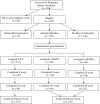Preventing postpartum smoking relapse among diverse low-income women: a randomized clinical trial
- PMID: 20154055
- PMCID: PMC2847071
- DOI: 10.1093/ntr/ntq001
Preventing postpartum smoking relapse among diverse low-income women: a randomized clinical trial
Abstract
Introduction: Postpartum relapse rates are high among women who spontaneously quit smoking during pregnancy. This randomized clinical trial tested a Motivation and Problem-Solving (MAPS) treatment for reducing postpartum relapse among diverse low-income women who quit smoking during pregnancy (N = 251; 32% Black, 30% Latino, and 36% White; 55% <$30,000/year household income).
Methods: Pregnant women were randomly assigned to MAPS/MAPS+ or Usual Care (UC). Continuation ratio logit models were used to examine differences in biochemically confirmed continuous abstinence at Weeks 8 and 26 postpartum by treatment group and moderators of the treatment effect. Analyses controlled for age, race/ethnicity, partner status, education, smoking rate, and the number of smokers in the participant's environment.
Results: MAPS/MAPS+ was more efficacious than UC in the prevention of postpartum relapse (p = .05). An interaction between treatment and the number of cigarettes smoked per day before quitting approached significance (p = .09), suggesting that the MAPS/MAPS+ treatment effect was stronger among women who smoked more cigarettes per day.
Discussion: MAPS, a holistic and dynamic approach to changing behavior using a combined motivational enhancement and social cognitive approach, is a promising intervention for postpartum smoking relapse prevention among low-income women, which may have particular relevance for women with higher prequit smoking rates.
Figures
References
-
- Agresti A. Categorical data analysis. 2nd ed. Hoboken, NJ: John Wiley & Sons; 2002.
-
- Allen AM, Prince CB, Dietz PM. Postpartum depressive symptoms and smoking relapse. American Journal of Preventive Medicine. 2009;36:9–12. - PubMed
-
- Allison PD. Logistic regression using the SAS system: theory and application. Cary, NC: SAS Institute and Wiley; 2001.
-
- Bandura A. Self-efficacy: Toward a unifying theory of behavioral change. Psychology Review. 1977;84:191–215. - PubMed
-
- Bandura A. Social foundations of thought and action. Englewood Cliffs, NJ: Prentice Hall; 1986.
Publication types
MeSH terms
Grants and funding
LinkOut - more resources
Full Text Sources
Medical




